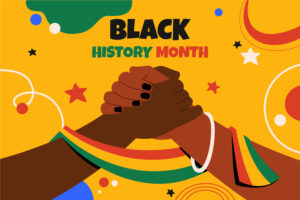In addition to being Teen Dating Violence Awareness Month, February is Black History Month. Roxanne T., a former volunteer and now a member of REACH's shelter staff, shares her thoughts on the significance of Black History Month and working in the field of domestic violence.
 It’s not every day that you encounter spaces that allow individuals the ability to feel heard. When I started volunteering with REACH a number of years ago, I certainly didn’t know what to expect...from being able to answer phone calls to working in the shelter. REACH was one of the first volunteer opportunities that incorporated domestic violence (DV) training that did not shy away from discussing the history of racial injustice in the United States as it relates to black people and specifically black women. This piqued my interest and led me down a path of researching racial injustice in the United States. Being an immigrant from the island of Jamaica I was fully aware of the struggle for equality. Fully aware of what it really means to be black in America. However, never and I mean never did I encounter an organization which openly acknowledged this. I began by reading Medical Apartheid by Harriet A. Washington. I began to not shy away from these discussions of race amongst people in the DV field and at the time in my graduate Criminal Justice courses.
It’s not every day that you encounter spaces that allow individuals the ability to feel heard. When I started volunteering with REACH a number of years ago, I certainly didn’t know what to expect...from being able to answer phone calls to working in the shelter. REACH was one of the first volunteer opportunities that incorporated domestic violence (DV) training that did not shy away from discussing the history of racial injustice in the United States as it relates to black people and specifically black women. This piqued my interest and led me down a path of researching racial injustice in the United States. Being an immigrant from the island of Jamaica I was fully aware of the struggle for equality. Fully aware of what it really means to be black in America. However, never and I mean never did I encounter an organization which openly acknowledged this. I began by reading Medical Apartheid by Harriet A. Washington. I began to not shy away from these discussions of race amongst people in the DV field and at the time in my graduate Criminal Justice courses.
Being outspoken about the racial injustice faced by people of marginalized groups allowed me to connect with survivors in various settings and be authentic. This is important in this work because people recognize authenticity. Survivors recognize it. Volunteering with REACH opened the doors for being a black woman and creating a space for survivors who share the same racial background as me to feel safe. I didn’t know how far I would get in this field but I knew I wanted to help and I wanted to feel comfortable. REACH provided me the space to be able to do that and support survivors and have those discussions about race when they felt that society at large has forgotten about them.
Working in the DV field I refer to the trainings at REACH that remind me that while I do not know everything, I can still be supportive. I can still be a strong advocate. I can still speak up when I see injustice. REACH brought me out of my shell.
What I want individuals to take away from this is that black people need to be heard and acknowledged...not just for Black History Month but every day. It is the only way that we are going to get to a place where we help survivors to the fullest. You can’t see me without my race. You cannot see survivors without their race or any part of their identity that is discriminated against in this society. Regardless of someone’s race, immigration status or socioeconomic status, all survivors deserve to be accepted without feeling ashamed of their identity. Especially the parts of their identity that they cannot hide.
Image by Freepik





